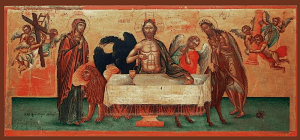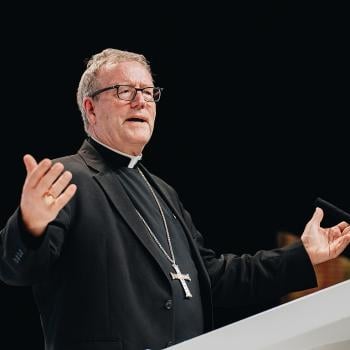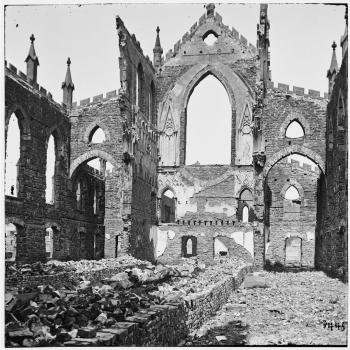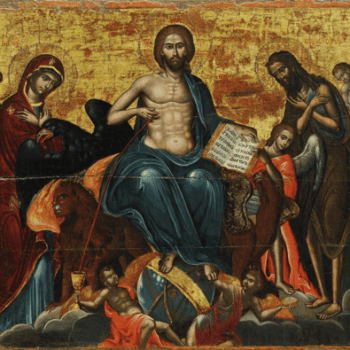
Dioceses are consolidating parishes and going bankrupt in the United States. Catholic bishops should realize there is a problem and deal with it properly. They must accept that the institutional Catholic Church has mismanaged itself, as can be seen in the way it covered up sexual abuse, and now it is dealing with the consequences of its actions. They must regain the trust of the people by accepting those consequences and becoming more transparent about what happened in the past; instead, it seems they still want to continue to cover things up and find ways to get out of paying the price for institutional sin. As the institution finds itself in decline, its hierarchy does not not want to place the blame on the institution and its failures, especially when they are themselves a major part of that failure; rather, they want to find a way to place the blame on others, including and especially society. This is one of the reasons why they engage culture wars, for they think by doing so, they can deflect attention from themselves; in reality, it only makes matters worse. And when it does, instead of realizing the mistake they have made, they double down on the culture war and use it as a central means for their engagement with the world, especially with evangelization, promoting hard core ideologues who embrace the culture war narrative even if they are not Catholic. Seeing so many in the hierarchy doing this, as well as many vocal Catholics among the laity, this had led many who see the way such ideologies stand against the teachings of Christ to question their place in the church. Many give up, but those who do not, those who remain within the institution, often do so for reasons contrary to what the USCCB is promoting, hoping that things will change for the better. Of those who leave, many do so, not because they have lost faith in Christ, but rather, because they feel the institution wants them out, and certainly, they do not feel as if the institution is reaching out to them, showing them that they are loved and respected. The sexual abuse scandal, which still has not been properly dealt with, is a symptom of a greater problem, that of spiritual abuse, and the mentality which justifies spiritual abuse is the same mentality which has been used by sexual abusers to justify themselves.
This is why the so-called eucharistic revival, and the Eucharistic Congress associated with it, is not going to do the institutional church any favors. Many of those already troubled by the institutional church see the revival merely as a ploy for the hierarchy to regain some of the power and authority they have lost. Those who have been sent out to preach for the revival tend to be the same kinds of ideologues, promoting extreme culture warrior views, that has led them to question the institution and whether or not it stands for Christ. Instead of culture warriors, they want those who serve as representatives of the institution to be more like Pope Francis, showing they truly care by being more pastoral instead of authoritarian, being more merciful than legalistic, and being those who personally go to the outskirts of society, to those who are being cast aside by many of the hierarchy of the church, showing them love and concern similar to the way Jesus did to the outcasts of his time.
If there is going to be a revival, the institutional church needs to listen to and follow the example of Pope Francis. If the clergy and the faithful were more interested in serving others with love, instead of defending themselves or their ideological concerns, they would find that love would resonate and the church could begin the process it needs to once again be a healthy representative of Christ in the world. But so long as the institutional church lets culture warriors and extreme right-wing groups like the Napa Institute and EWTN be the voice and determining factor of what American Catholicism is like, we will find the institution will continue to shrivel up and lose all the vitality it should have.
The Pew Research Center, which, to be sure, is not infallible, especially when it deals with theological concerns, gives us some things to consider if we want to understand the status of the institutional Catholic Church in the United States today. According to them, the number of US adults calling themselves Catholic are at 20%, while it was 24% in 2007. Similarly, that population is ageing, with nearly 60% of adult Catholics being 50 or older. Most of those Catholics are Caucasian (57%), with Hispanics being a distant second at 33%. Catholics are just as educated as the rest of the American population, with a third having at least a bachelor’s degree. Only 28% of those who say they are Catholic go to weekly services, but those who do not, still consider their faith important, and 52% of self-identifying Catholics prat on a daily basis. 52% of those self-identifying Catholics are registered Republicans, but they do not always agree with the culture war, as about 60% of those Catholics think abortion should be legal. Finally, 75% of them have a favorable view of Pope Francis.[1]
What this tells us is that not only is the Catholic population declining, as it is also ageing, it will soon find itself declining at a faster rate than it is now. While some dioceses suggest conversions are up, as a whole, the institutional church is not properly engaging the younger generations, and if the hierarchy thinks doing everything the same as usual, including and especially engaging the culture war narrative they have embraced for the last couple decades, they will likely find their initiatives unsuccessful; the few they might convince with it will be dwarfed by those who feel pushed away and leave because of it. The culture war is all about legalism, power, and authority, without any sense of mercy, love, or solidarity.
The so-called eucharistic revival is all about show. It is about making sure people say the right things, dogmatically, even if they do not truly understand what the dogma means (and so end up misunderstanding Catholic teaching, such as those who confuse the real presence as being a physical presence). They are not being shown a true eucharistic spirituality, one based upon communion and the bonds of love which communion should bring about. Instead, we see the eucharist being treated as a special thing, a magical charm, as it were, and if we want to receive it, we are told we must embrace the culture war and the hierarchy which has brought it about. All this will end up doing is having many more Catholics scratch their heads at the hierarchy and either ignore them, or worse, believe them and believe there is no longer any place for them in the church and leave.
A true eucharistic revival would be transformative. It would not be ideological in content, but rather, would work to break through such ideologies, just as Jesus did in his ministry, and find a way to have Catholics come together in love. Then, with that love, they will be able to share what they have received with others. The revival should lift them up in their spirit, and that is done when Christians become the people of love Christ expected them to be, a people which cares for the needs of others:
No human being should be considered worthless by another. That nature which the Creator of the universe made his own should not be looked down upon in anyone. Is it permitted for any of the hired hands to refuse that payment which the Lord declares to have been given him? Your fellow servant receives assistance, and the Lord returns thanks. Food for someone in need is the cost of purchasing the kingdom of heaven, and the one who is generous with temporal things is made heir of the eternal. [2]
God became human in the incarnation so that the barriers between God and creation could be bridged. The two were made one. Christ came to break down all those barriers, not by force, annihilating resistance, but with bonds of love, bringing everyone back together as one, and in doing so, find themselves being made better as they come together than when they were apart. Those who partake of the eucharist should let it transform them so that Christ can be seen working in and through them; it should help them continue Christ’s work in time, bridging the barriers which sin tries to reinforce, so that through their work, everyone can realize their natural unity and live it out in and through the love which makes it possible. When the eucharist is used to promote ideology instead of people, all it will do is divide, and those who divide the church in this fashion risk being the ones unworthy of its reception. We need to let Christ in the eucharist become one with ourselves, so that we truly become what we eat, the body of Christ, so that Christ can be seen once again in the world, drawing people together due to God’s healing love. Then, the reality of the eucharist will be known by action, not words; only then can there be a eucharistic revival which will help revitalize the church.
[1] See Justin Nortley, Patricia Tevington and Gregory A. Smith, “9 Facts About US Catholics” in Pew Research Center (4-12-2024).
[2] St Leo the Great, Sermons. Trans. Jane Patricia Freeland CSJB and Agnes Josephine Conway SSJ (Washington, DC: CUA Press, 1996), 40 [Sermon 9].
Stay in touch! Like A Little Bit of Nothing on Facebook.
If you liked what you read, please consider sharing it with your friends and family!
N.B.: While I read comments to moderate them, I rarely respond to them. If I don’t respond to your comment directly, don’t assume I am unthankful for it. I appreciate it. But I want readers to feel free to ask questions, and hopefully, dialogue with each other. I have shared what I wanted to say, though some responses will get a brief reply by me, or, if I find it interesting and something I can engage fully, as the foundation for another post. I have had many posts inspired or improved upon thanks to my readers.













